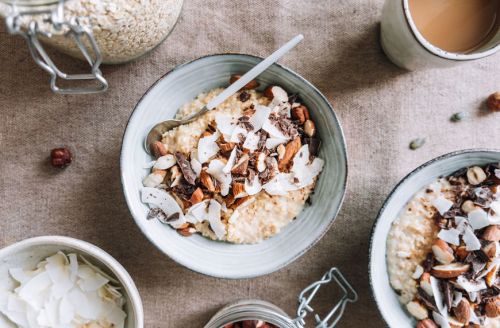We’ve all been hearing for years that almonds are good for you. They’re a plant-based protein! They have fiber! They’re the go-to snack for practically every nutritionist! But the fixation on almonds has gotten to a point where they feel like old, been-there news (right up there with drinking lemon water and going to bed on time).
However, just because almonds aren’t exactly the hottest, newest wellness go-to (that would be my friends CBD and CBN) doesn’t mean that they don’t have benefits. There’s a good reason (besides their taste, of course) that almonds are a beloved food and a mainstay in the alt-milk world. Here’s what you should know about the OG healthy snack:
What are the health benefits of almonds?
1. They’re full of fiber. “Ounce for ounce, almonds contain more dietary fiber than any other tree nut,” says Caroline West Passerrello, MS, RDN, LDN, spokesperson for the Academy of Nutrition and Dietetics. They have 3.5 grams of fiber per ounce, compared to the 2.4 you’d get in an ounce of peanuts or the paltry 0.9 grams you’d get from cashews. (Only pistachios are about on-par with almonds in this regard.) Fiber of course is linked to tons of health benefits, from promoting digestive health to lowering cholesterol and reducing your risk of serious disease like heart disease and breast cancer.
2. They have more protein than most other nuts. All nuts are great sources of protein, but almonds really lead the pack. “With six grams of protein per ounce, almonds are one of the nuts with the highest protein per ounce,” says Passerrello. And combined with the fiber, that protein will help you stay full and satisfied long after you’re done snacking.
3. Almonds promote heart health: Thanks to its fatty acid profile (high in MUFAs and oleic acid, low in saturated fat), every one ounce of almonds eaten daily is associated with a 3.5 percent decrease of cardiovascular disease risk over 10 years, per research in the British Journal of Nutrition.
4. They can help stabilize blood sugar levels. Eating one-and-a-half ounces of almonds as a snack can help lower blood sugar levels and decrease appetite, so you’re less likely to still feel hungry after munching, according to a small Australian study. The snacky habit also appeared to boost the body’s vitamin E levels, an antioxidant that sops up damaging free radicals.
Almonds are great, but when it comes to nut butters, here’s why PB is still king:
This all sounds great to me—so how many almonds should I be eating to reap these benefits?
One serving of almonds is one ounce, which translates to about 23 almonds. If you’re not about to count out your almonds individually (don’t blame ya), it’s essentially the amount that would fit on a standard, 3×3 sticky note or in a quarter cup, says Passerrello. And that serving size is flexible. “Depending on your overall daily intake and requirements, you may want more or less than 23 almonds,” she says. (Here’s our plug for seeing a registered dietitian. They can help you figure out how almonds—and any other food, really—can fit into your daily eats.)
What’s the best way to eat almonds (besides by the fistful)?
You’ll most benefit from the fiber and protein if you eat almonds in their whole form (rather than, say, almond milk). Passerrello has her almond-eating clients keep them in a container ready-to-go at the first sign of stomach growls. You don’t just have to stick with plain, whole almonds, because that would get boring, fast. Passerello recommends making them spicy with this easy recipe: toss two to three cups of almonds with a beaten egg white. Sprinkle them with salt and your favorite spices and herbs (like Za’atar, chili powder, and cumin), then roast at 300 degrees for 40 minutes.
Here are a few more ideas:
- Toss slivered almonds atop a salad for crunch, recommends Passerrello.
- Stir chopped almonds into oatmeal or sprinkle on yogurt.
- Make your own trail mix at home with roasted almonds, dried apricots, and whole grain cereal.
- Have chocolate-covered almonds for dessert; research shows it’s good for your ticker. (Big thanks to Pennsylvania State University researchers for that study.)
- Toss soaked almonds in your blender when making a smoothie for extra fiber.
Really, unless you’re allergic to almonds, it’s nuts to not be eating them on the regular. Your bod (and your taste buds) will thank you.
But how do peanut and almond butters compare nutritionally? And here are some other healthy salty snack ideas for when you’re sick of almonds.
Sign Up for Our Daily Newsletter
Get all the latest in wellness, trends, food, fitness, beauty, and more delivered right to your inbox.
Got it, you've been added to our email list.










